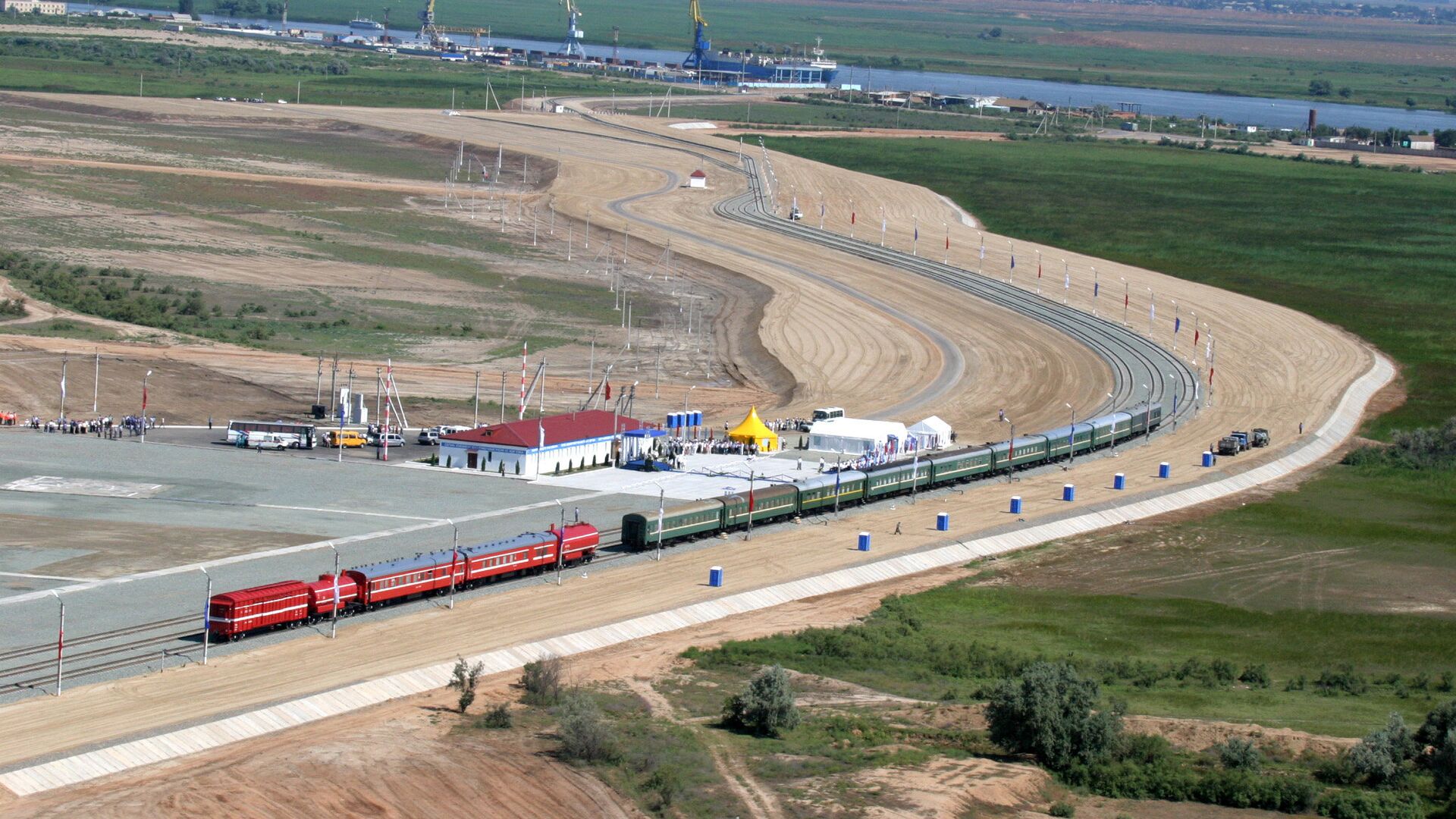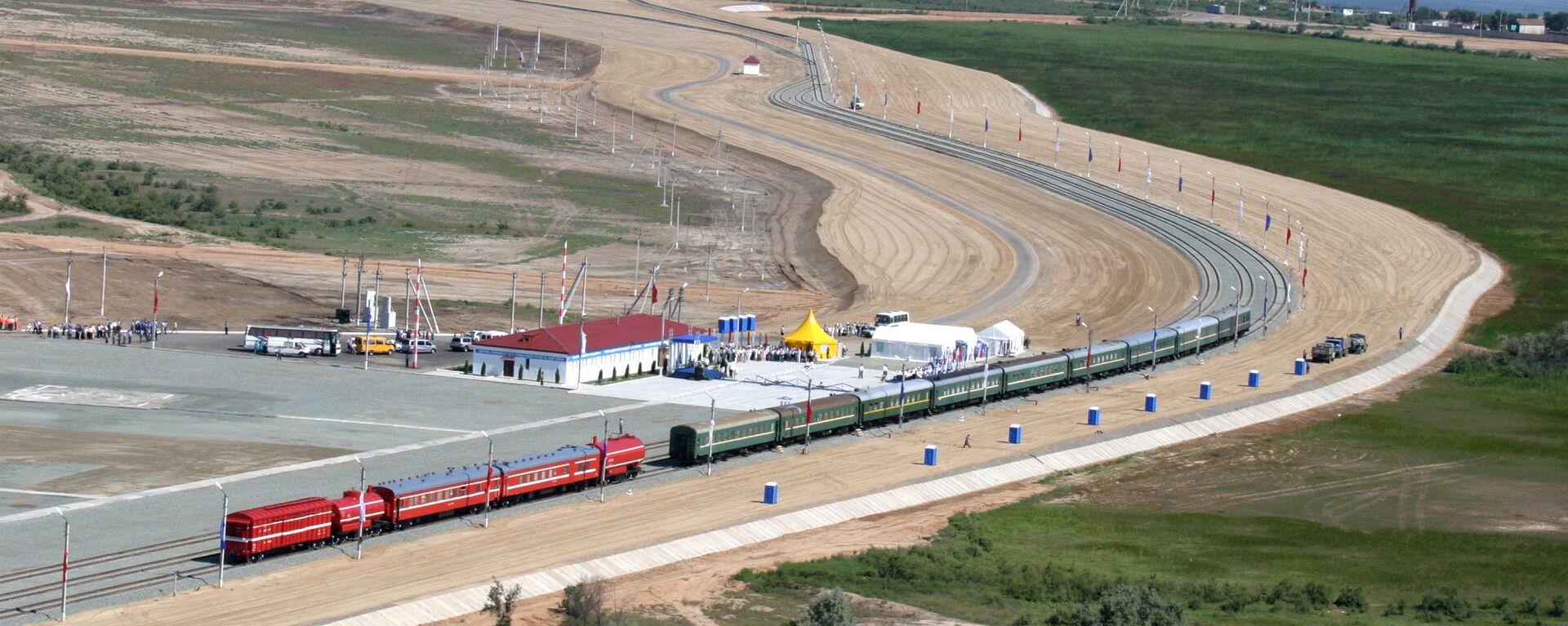https://sputniknews.in/20240620/pakistan-to-join-international-north-south-transport-corridor-7664833.html
Pakistan to Join International North-South Transport Corridor
Pakistan to Join International North-South Transport Corridor
Sputnik India
Islamabad's Ambassador to Russia Muhammad Khalid Jamali said on Wednesday that his country seeks to join the project as a regional economic partner.
2024-06-20T17:08+0530
2024-06-20T17:08+0530
2024-06-20T18:12+0530
business & economy
shanghai cooperation organisation (sco)
pakistan
vladimir putin
russia
moscow
brics
https://cdn1.img.sputniknews.in/img/07e7/0c/1c/6004616_0:107:2048:1259_1920x0_80_0_0_6e393c5f28022d96f3162e849f5eac1a.jpg
Pakistan has accepted an invitation from Russian President Vladimir Putin to join the International North-South Transport Corridor (INSTC) and has started the membership process, Ambassador to Russia Muhammad Khalid Jamali has said while addressing the International IT-Forum in the Russian city of Khanty-Mansiysk.The INSTC is a 7,200-km-long multimodal transportation network connecting Central Asia, North Europe, India, Iran, Azerbaijan, and Russia. The corridor includes seaports in the Gulf and Caspian regions, as well as interlinked and interconnected road and rail routes.The envoy emphasised the strong bilateral relationship between the two countries, highlighting their cooperation in international strategic structures like the Shanghai Cooperation Organization (SCO) and the United Nations, as well as in applying for BRICS+ membership.Moreover, he further added, "Pakistan has imported 1 million tons of crude oil from Russia and is seeking continuous access to Russian oil and gas." Jamali also unveiled data from Pakistan's strong agricultural sector, with 69% of the population employed in this industry. He claimed that there has been progress in reviving the historic Silk Road, evidenced by the successful transportation of Pakistani citrus fruits to Russia's Dagestan region via Iran and Azerbaijan.Prospects for Regional Integration and CooperationThe evolving global landscape and paradigm shift may herald a new era of connectivity, transitioning from geopolitical to geoeconomical partnerships, and fostering cohesion within the emerging multipolar world order. In this light, Sputnik India reached out to several analysts regarding the prospects for Pakistan.Khalid Taimur Akram, Executive Director Pakistan Research Center For a Community with Shared Future ( PRCCSF), told Sputnik India that the state's entry into the INSTC is a significant development that holds immense promise for the country and the entire region.He expressed confidence that the move should boost trade and economic cooperation between the countries, and provide Pakistan with access to new markets and investment opportunities.Moreover, he added that the country is already engaged with the China-Pakistan Economic Corridor (CPEC), and the connectivity with the INSTC would bolster the transit network even further.In the meantime, Muhammad Taimur Fahad Khan, a geopolitical analyst, and associated with the Institute of Strategic Studies in Islamabad (ISSI), told Sputnik India that by joining the INSTC, Pakistan stands to significantly enhance its connectivity with Russia, Europe, and Central Asia, providing alternative trade routes that reduce dependency on traditional seaways.Confronting ConundrumsKhan opined that significant investments are required to develop the necessary infrastructure within Pakistan, including modernizing roads, railways, and ports, and more importantly, effective coordination between governmental and private entities is crucial for the successful execution of these projects, as mismanagement and delays could hinder progress.Regarding the challenges that the INSTC corridor poses for Pakistan, Dr. Mehmood Ul Hassan Khan, the executive director at the Center for South Asia & International Studies, shared with Sputnik India that the composition, main stakeholders, origin and end destination of this corridor were the main reasons for Pakistan's involvement in it. However, the Indian factor, Iran's comparative advantage, the fear of US sanctions, and the denial of regional connectivity projects pertaining to Pakistan are the primary policy hurdles hindering Pakistan's involvement in this regard.In the meantime, the potential rail link between Iran and Russia promises significant economic advantages, but the project is still in development. In July 2023, former Iranian President Ebrahim Raisi stressed the need for relevant institutions to accelerate the development of ports within the INSTC framework.
https://sputniknews.in/20240420/need-for-north-south-transport-corridor-increases-amid-middle-east-crisis-media-7180977.html
pakistan
russia
moscow
Sputnik India
feedback.hindi@sputniknews.com
+74956456601
MIA „Rossiya Segodnya“
2024
Muhammad Sharif
https://cdn1.img.sputniknews.in/img/07e7/0b/05/5257054_0:0:443:444_100x100_80_0_0_b8bd2af32be62a6eecdb4a84c7fd978f.jpg
Muhammad Sharif
https://cdn1.img.sputniknews.in/img/07e7/0b/05/5257054_0:0:443:444_100x100_80_0_0_b8bd2af32be62a6eecdb4a84c7fd978f.jpg
News
en_IN
Sputnik India
feedback.hindi@sputniknews.com
+74956456601
MIA „Rossiya Segodnya“
Sputnik India
feedback.hindi@sputniknews.com
+74956456601
MIA „Rossiya Segodnya“
Muhammad Sharif
https://cdn1.img.sputniknews.in/img/07e7/0b/05/5257054_0:0:443:444_100x100_80_0_0_b8bd2af32be62a6eecdb4a84c7fd978f.jpg
pakistan, north-south, transport, corridor
pakistan, north-south, transport, corridor
Pakistan to Join International North-South Transport Corridor
17:08 20.06.2024 (Updated: 18:12 20.06.2024) Islamabad's Ambassador to Russia Muhammad Khalid Jamali said on Wednesday that his country seeks to join the project as a regional economic partner.
Pakistan has accepted an invitation from Russian President Vladimir Putin to join the
International North-South Transport Corridor (INSTC) and has started the membership process, Ambassador to Russia Muhammad Khalid Jamali has said while addressing the International IT-Forum in the
Russian city of Khanty-Mansiysk.
The
INSTC is a 7,200-km-long multimodal transportation network connecting Central Asia, North Europe, India, Iran, Azerbaijan, and Russia. The corridor includes seaports in the Gulf and Caspian regions, as well as interlinked and interconnected road and rail routes.
The envoy emphasised the strong bilateral relationship between the two countries, highlighting their cooperation in international strategic structures like the
Shanghai Cooperation Organization (SCO) and the United Nations, as well as in applying for
BRICS+ membership.
Moreover, he further added, "Pakistan has imported 1 million tons of crude oil from Russia and is seeking continuous access to Russian oil and gas." Jamali also unveiled data from Pakistan's strong agricultural sector, with 69% of the population employed in this industry. He claimed that there has been progress in reviving the historic Silk Road, evidenced by the successful transportation of Pakistani citrus fruits to Russia's Dagestan region via Iran and Azerbaijan.
Prospects for Regional Integration and Cooperation
The evolving global landscape and paradigm shift may herald a new era of connectivity, transitioning from geopolitical to geoeconomical partnerships, and fostering cohesion within the emerging
multipolar world order. In this light, Sputnik India reached out to several analysts regarding the prospects for
Pakistan.
Khalid Taimur Akram, Executive Director Pakistan Research Center For a Community with Shared Future ( PRCCSF), told Sputnik India that the state's entry into the INSTC is a significant development that holds immense promise for the country and the entire region.
He expressed confidence that the move should boost trade and economic cooperation between the countries, and provide Pakistan with access to new markets and investment opportunities.
"One of the key benefits of the North-South Transport Corridor for Pakistan is that it will reduce the country's reliance on the Suez Canal for trade with Europe and Africa. This will help reduce shipping costs and improve the efficiency of Pakistan's exports. Additionally, the corridor will provide Pakistan with an alternative route for trade with Central Asia, which is a growing market for Pakistani goods. It also has the potential to boost tourism in Pakistan," Akram underscored.
Moreover, he added that the country is already engaged with the
China-Pakistan Economic Corridor (CPEC), and the connectivity with the INSTC would bolster the transit network even further.
In the meantime, Muhammad Taimur Fahad Khan, a geopolitical analyst, and associated with the Institute of Strategic Studies in Islamabad (ISSI), told Sputnik India that by joining the INSTC, Pakistan stands to significantly enhance its connectivity with Russia, Europe, and Central Asia, providing alternative trade routes that reduce dependency on traditional seaways.
"This strategic move promises economic growth by stimulating local industries and attracting foreign investment, while also bolstering Pakistan's geopolitical influence as a crucial node in regional trade networks. For the region, the INSTC fosters stronger diplomatic and economic ties among participating countries, promoting stability and economic synergy," Khan underscored.
Khan opined that significant investments are required to develop the necessary infrastructure within Pakistan, including modernizing roads, railways, and ports, and more importantly, effective coordination between governmental and private entities is crucial for the successful execution of these projects, as mismanagement and delays could hinder progress.
"Geopolitical dynamics pose a risk, with regional conflicts and political instability in areas like Iran and Afghanistan potentially disrupting trade routes. Balancing diplomatic relationships with regional and global powers, including China, India, and the US, adds another layer of complexity. Harmonizing customs procedures and trade regulations with other countries in the INSTC is essential for the seamless transit of goods, while ensuring the security of transport routes against threats such as terrorism and smuggling is critical," the pundit unveiled.
Regarding the challenges that the INSTC corridor poses for Pakistan, Dr. Mehmood Ul Hassan Khan, the executive director at the Center for South Asia & International Studies, shared with Sputnik India that the composition, main stakeholders, origin and end destination of this corridor were the main reasons for Pakistan's involvement in it. However, the Indian factor, Iran's comparative advantage, the fear of US sanctions, and the denial of regional connectivity projects pertaining to Pakistan are the primary policy hurdles hindering Pakistan's involvement in this regard.
"Rapidly changing socio-economic and geopolitical conflicting realities in the region and beyond forced the government of Pakistan to stay away from this corridor, and more importantly, radicalization and terrorism among the proposed route of the INSTC and the notorious role of the non-state actors pushed the Pakistani policymakers [previously] not to join this mega project of regional connectivity," he exclaimed.
In the meantime, the potential rail link between Iran and Russia promises significant economic advantages, but the project is still in development. In July 2023, former Iranian President Ebrahim Raisi stressed the need for relevant institutions to accelerate the development of ports within the
INSTC framework.



